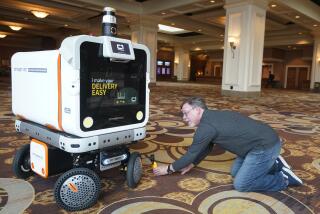THE CUTTING EDGE : Computers Catapult to Star Status at 1995 Electronics Showcase
- Share via
Once upon a time, there were television sets and stereos and VCRs and video game consoles. They generally plugged into the wall. They were appliances unto themselves, and they dominated the annual Consumer Electronics Show, which opens Friday in Las Vegas.
But this is 1995, when Toys R Us is blaming computer purchases for cutting into holiday toy sales and gadget-mongers want to be connected not just to their devices but to each other. The personal computer has become a consumer electronics item, and in its various incarnations, it is overwhelming this year’s show.
The Electronic Industries Assn. is expected to announce Friday that dollar sales of personal computers exceeded those of television sets in the United States for the first time. Computer hardware and software vendors will occupy 30% more floor space than last year in the vast Las Vegas Convention Center.
And the big news at the show will be, of all things, a new PC interface from Microsoft Corp. called Bob. Aimed at the vast majority of home computer users who categorize themselves as novices, the software uses animated characters to guide users through eight programs, including a household organizer, an address book, electronic mail and a bill-paying program.
Microsoft Chairman Bill Gates is scheduled to introduce the software Saturday morning. It’s due out in March and will cost around $100. No manual included.
The video game vendors who have dominated the CES show in recent years aren’t exactly ceding the floor to the PC crowd. Rather, they’re trying to adapt to the new environment, not only with more sophisticated machines but with new types of game delivery.
Nintendo of America said Tuesday it planned to co-publish a video game with GTE Corp.--to be shown for the first time at CES--as the first step in an alliance that both firms expect to lead to ventures in on-line gaming.
While rival Sega of America recently launched the Sega cable channel, and was quick to partner with Catapult--a start-up that allows users to play video games over phone lines--Nintendo has historically been wary of using cable or telephone networks to deliver its games.
“It’s true we have not explored this area in the past, or the things we have explored have not come to fruition,” said Howard Lincoln, Nintendo’s chairman. “But we recognize that times are a-changing and there is going to be a market out there for interactivity and networked games.”
For many, the PC equipped with a CD-ROM player is now the game machine of choice. That, and the prospect of games delivered electronically over some piece of the information superhighway, has sparked an explosion in game software development.
GTE hopes the Nintendo name and marketing clout will help get its software publishing division, which officially launches at CES this week, off the ground. And computer maker Packard Bell joins GTE and several others in debuting its first collection of software titles at the show. Prodigy Services Co. will be showing its World Wide Web browser and new interface.
The coming of the so-called information superhighway is also in part responsible for the approaching war over the digital video disc player--billed as the next-generation VCR--which will continue to be waged in Las Vegas this weekend.
In a world of movies-on-demand, where consumers don’t have to leave their couches to rent a film, consumer electronics and entertainment executives hope the 5-inch compact discs which can hold a full-length movie will induce consumers to buy rather than rent.
Hollywood studio executives will be looking closely at the demonstration of Sony Corp.’s prototype of its machine and the quality of the picture on its discs, the technical specifications for which it introduced last month with partner Philips Electronics N.V. Time Warner and Toshiba are backing a competing standard.
The dueling standards is reminiscent for many consumer electronics industry veterans of the VCR-Betamax battle of the 1980s who say things haven’t changed so much after all. “They’re all very eager to have the studios say we give the Good Housekeeping seal of approval,” said Bob Lambert, vice president of technology at Walt Disney Co. “But it’s like being shown a car and not being told what the price is.”






